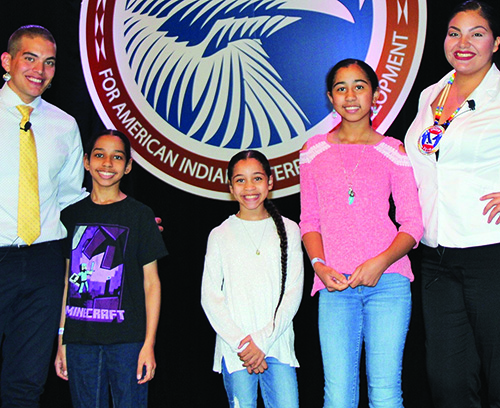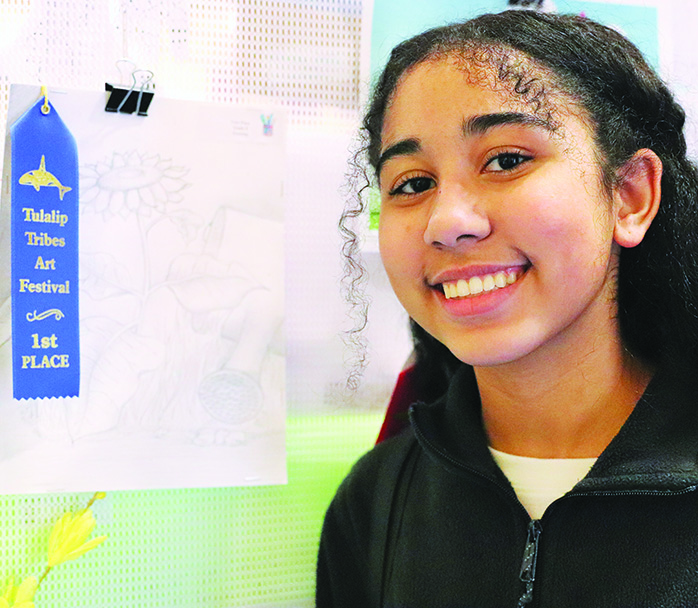
By Micheal Rios
Two quick stats. First, at least 124,000 public and private schools in the United States have closed due to coronavirus concerns. Second, approximately 55 million students are impacted by these widespread school closures. The stark reality for many families is they are left struggling to cope with an unprecedented global pandemic while being responsible for their now home-bound children’s education.
Tulalip tribal member Angela Davis understands the complexities involved with homeschooling children. Her three children 15-year-old Samara, 14-year-old Samuel and 12-year-old Abigail have been homeschooled their entire life. Together with her spouse, Angela and John Davis III have a system that is proven to be effective and successful.
While residing on the Tulalip Reservation, their children attend school from the comforts of home. In fact, inside the Davis residence is a dedicated education room with three desks, a white board, projector, and a book shelf full of textbooks and miscellaneous reading material.
Angela was gracious enough to do an interview with Tulalip News. What follows is a condensed transcription of that interview in which the veteran homeschooler offers a number of tips and insights for parents new to the homeschool scene.

SYS: Your three children have only been homeschooled. What prompted you and your husband to opt for this?
Angela: Our number one priority is the safety of our children. The world has changed from when we were kids. We might have had our bullies at school, but for the most part we weren’t exposed to too much. Today, students are exposed to so many different situations that take away from enjoying life and learning. Unfortunately, when it comes to bullying at school (whether it is from another student or a teacher/staff) it seems like it is getting more and more difficult for the school to take action and rectify the situation. From many aspects, it is unfortunate our tribal kids have to deal with that.
SYS: From your experience, what are some of the best benefits to having your children learn from home?
Angela: A big benefit is allowing your children to learn more than what the public school curriculum provides. As we have seen, there is a lot of misinformation about history and so many other things being taught. By homeschooling we get to choose how information is given to our children, meaning there is just not one perspective given, but many. Our children take in multiple perspectives and then can make an educated decision on what they choose to believe.
SYS: Do you find this kind of learning flexible to more out of the classroom teaching?
Angela: Yes, we do. Flexibility is another added benefit. For example, if we wanted to go on a field trip to learn about a particular subject we can go at any time. If we have appointments during the day, we can just catch up later or the following day. If we wanted to or needed to travel we could take homeschooling with us. Balancing life and learning for each family’s situation is doable once you find a comfortable structure.
SYS: Structure and adhering to a consistent schedule have to be critical to long-term success, right?
Angela: Absolutely. Although the structure of a schedule is dependent on each family’s situation and what works best for them. We tend to believe getting up early and starting school at a regular time is most effective for consistency. Sticking to this kind of daily structure prepares children to become productive adults who enter the workforce or start their own business.
SYS: For parents with multiple children, like yourself, there might be a tendency to feel like you have to divide up your time unequally. How do you deal with that?
Angela: We focus on the fact that our children at home receive more one-on-one attention than they would in a public school setting. If you have a class of 25 students versus a class of 3 students, the attention of the teacher is not divided nearly as much. Plus, we are able to spend more time with a child that is struggling, while the other two continue to do their work.
If a family has children that are more separated in age, they may need to get a little more creative on who gets the “teachers” attention and when. Also, the older children can help their siblings with subjects as needed, so it can become a family effort to educate each other.
SYS: How do you decide which curriculum to teach? Is there a guide you follow day by day or week by week?
Angela: The good news is that it is up to the parents to choose. There are many options to choose from. I have learned that you have to consider two things: 1.) The parents’ teaching style and 2.) The child’s learning style.
I suggest parents do some research to figure out what style works best for them and how they learn the best. Parents also need to go in with the understanding that what they first choose might not work the best for them or only certain parts of it might work and certain parts don’t. They can change to a different curriculum at any time.
We’ve alternated between textbooks, online programs, using the school district’s K-12 program, and even mixing multiple sources. It really is up to the parent as long as they are teaching the core subjects.
SYS: When you get stuck or need assistance with a certain subject, either learning it yourself or teaching it, what do you do?
Angela: There are Support Groups and Co-Ops located in each county that homeschoolers can be a part of that help each other with certain subjects and events. I recommend: https://washhomeschool.org/homeschooling/support-groups-co-ops/ and Homeschool Support Group 6
SYS: Besides the book schooling, do you make learning other skills like art, craft making or instruments part of the typical routine?
Angela: Yes, we do. It is important to balance book work with hands-on skills and activities to help keep the kids engaged. This way they are exposed to new skills that may turn into their passion. Our family stresses the need to learn hands-on skills so that they will always have something to fall back on if they are having difficulties in the workforce. We also explain that with these skills, they may be able to start their own businesses and be self-sufficient.

SYS: What activities or skills have you found your kids most engage in?
Angela: All types really. We’ve had them dabble in piano lessons, singing, computer programming, and making clothes with a sewing machine. All three have developed their own personal style when it comes to traditional arts and crafts. They’ve made beaded hoop earrings, traditional hand drums, and look forward to submitting their creations in various categories at the Tribe’s annual art festival.
SYS: What resources do you look to or recommend for families who are struggling with homeschooling?
Angela: There are so many resources available, but my first go to is researching online at the Washington Homeschool Organization (WHO). They provide a lot of information in one place, such as the laws for the state, training for the parents, and many other resources. https://washhomeschool.org/homeschooling/the-law/
Some other websites to help with determining what system works best for your family would be curriculum reviews and teaching methods:
https://thebestschools.org/magazine/homeschool-style-right/ and
https://homeschool-curriculum-reviews.com
SYS: Last question. Has the current Coronavirus crisis affected your kids’ ability to be educated in any way? And have you added the global impacts of COVID-19 into their curriculum?
Angela: The Coronavirus crisis has not affected my kids’ ability to be educated in any way. Our curriculum is mostly textbook based so we have all the items we need at home, and if we were completely online, that would not have affected us either.
Our normal teachings include real world and current events in which my children are very aware of what is going on in our Tulalip community, state, country and even globally. This information is incorporated as part of our curriculum on a daily basis.
The biggest impact that this crisis has had on my children is not being able to go out freely as before, whether if it was to a field trip or a community event, or simply visiting their grandparents and family. Fortunately, we have technology that still allows for us to connect and continue to learn.